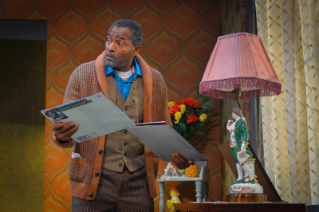
Carl Lumbly as Alfred, a cantankerous and aging West Indian immigrant, in Kwame Kwei-Armah’s intimate family drama, Let There Be Love, playing at A.C.T.’s Geary Theater through May 3, 2015. Photo by Kevin Berne.
Let There Be Love: Family Drama by Kwame Kwei-Armah. Directed by Maria Mileaf. American Conservatory (A.C.T.)Theater, 415 Geary St., S.F. (415) 749-2228 or www.act-sf.org. April 15 – May 3, 2015
LET THERE BE LOVE a ‘must see’ show at A.C.T. [Rating:5]
In 1957 Britain’s Arnold Wesker (now Sir Arnold) wrote a play titled The Kitchen that gave birth to the term “kitchen sink drama.” That spawned a myriad of plays of that genre that slowly lost favor with playwrights and today it is difficult to find such well written plays with classical beginning, middle and end (dénouement). Woven into the structure of Wesker’s plays are themes of self-discovery, love, confrontation of death and social/political disillusionment. British born playwright Kwame Kwei-Armah can doff Wesker’s mantle with his latest play Let There Be Love receiving standing ovation production at the American Conservative Theatre (A.C.T.).
Just as Wesker’s kitchen plays unfolded in his world at the time they were written, so does Kwei-Armah’s Let There Be Love. The time is ‘Now’ and the place is London. There are two protagonists. The aging black Alfred (Carl Lumbly who arrived in London in 1963 from his native Grenada and young white Marie (Greta Wohirabe) a part-time care giver newly arrived from Poland. Both have emigrated to seek a better life. A third character is Gemma (Donnetta Lavinia Grays) Alfred’s disenfranchised 35 year old daughter who refuses to be a sounding board, often responding with vitriol, to the irascible Alfred who has as undefined medical illness.
All the action takes place in the living room of Alfred’s home within a time frame of several months. The sparks between Alfred and Gemma explode in the first scene when he learns that his daughters have arranged for a caretaker to look in on him a few hours a week. The unseen daughter has married a white man and he refers to her children as “half-breeds” especially when he is smoking marijuana. This obviously is not conducive to genial family relationships.
With the dramatic entrance of Marie the play builds in well-defined incidents with fits-and-starts between Alfred and Marie ending in a predicable but plausible friendship. Although Alfred has denied Gemma’s request to move in with him, he eventually invites Marie, who is being abused by her boyfriend, to do so and he becomes her mentor and she his confidant.
Woven into the script are the songs of Nat King Cole that are played on a “state of art” radio-record player that were ubiquitous in the 60s. The songs, as well as the gramophone, add a touch of nostalgia as they dove-tail into the storyline when we learn that Alfred has terminal cancer and he is reading a book Final Exit that is a primer on gracefully ending one’s own life.
One could quibble about some inconsistencies in the plot but there is only praise for the tour-de-force acting of Carl Lumbly who has been a mainstay on Bay Area stages for the past few years. In this production his demeanor is a direct opposite of his brilliantly underplayed role in Tree at SF Playhouse. Greta Wohirabe’s debut at A.C.T. is memorable. The Bay Area and beyond will have the pleasure of seeing her in multiple venues this coming summer. Donnetta Lavinia Grays as Gemma is a dynamic force in her confrontations with the vitriolic Alfred.
Maria Mileaf’s direction appropriately varies the pace keeping all the parts in balance including moving Lumbly around in a wheel chair. Running time is two hours and 10 minutes. Highly recommended. CAST: Carl Lumbly, Donnetta Lavinia Grays and Greta Wohirabe
CREATIVE TEAM: Maria Mileaf (director); Dan Ostling (set design); Russell Champa (lighting design); Lydia Tanji (costume design); Bart Fasbender (sound design).
Kedar K. Adour, MD Courtesy of www.theatreworldinternetmagazine.com
Carl Lumbly as Alfred, a cantankerous and aging West Indian immigrant, in Kwame Kwei-Armah’s intimate family drama, Let There Be Love, playing at A.C.T.’s Geary Theater through May 3, 2015. Photo by Kevin Berne.


